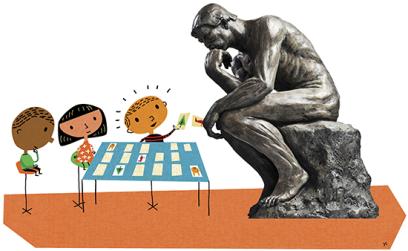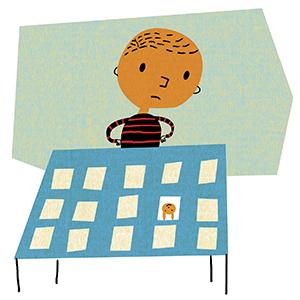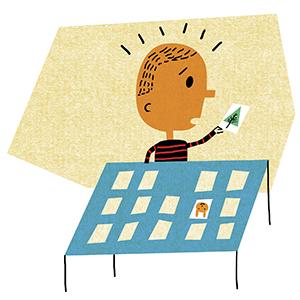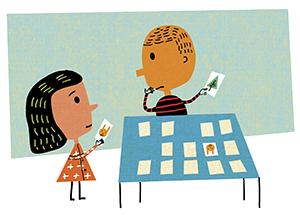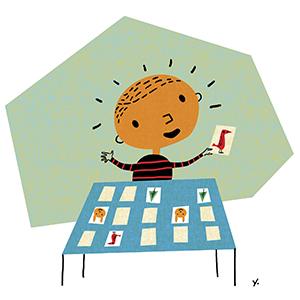Question: Part of me feels funny asking students to memorize content knowledge because I know they are going to forget a lot of it. (After all, I know I have forgotten a lot of what I learned in middle school.) What does the research say about memorizing things for school that you’re just going to forget later?
Answer: We certainly forget things over time, and there’s no reason to expect that what students learn in school should be any exception. But take heart: we don’t forget everything, and under some conditions, we remember nearly everything. Researchers have some understanding of why we’re likely to overestimate what we’ve forgotten. And most important, there is some evidence that the memory of what we’ve learned in school matters—and actually makes us smarter.
* * *
“Education is what remains after one has forgotten what one has learned in school.”
This quotation is variously attributed to Albert Einstein, Ralph Waldo Emerson, Harvard President James Bryant Conant, psychologist B. F. Skinner, and many others. (In fact, its origins are obscure.)1 The quotation is typically invoked in one of two contexts. Either the author means to suggest that schools do not teach things that really matter in life, or, on the contrary, that schools do educate, even though we forget most of the details we’re asked to learn.
Seldom questioned is the assertion that what’s learned in school is forgotten. Perhaps it seems self-evident. Many of us have come across a decades-old test paper and been shocked to see that, at one time, we could name Brazil’s most important exports or prove that two angles are complementary.
Nevertheless, the contention that we forget most of our education is wrong. Naturally, lessons learned in school are subject to forgetting, like any other experience, but some of what we learn stays with us. Let’s look at the conditions that contribute to retaining or losing school lessons. Then we’ll examine the reasons we might overestimate forgetting.
What Do We Remember from School?
The year-end cumulative examination used in many classrooms suggests a natural experiment; what if students took the same exam a second time, say, a year later? Many experiments have relied on this basic structure, with the second exam composed of different questions than the first but testing the same concepts. The upshot? There’s less forgetting than you might think.
Learning loss is usually expressed as a percentage of original performance; for example, students averaging 80 percent correct on test one and 40 percent correct on test two would have shown a 50 percent loss. A review from the mid-1990s pulled together the existing experiments on this issue and reported that, in 22 experiments using test questions that demanded students recall information (for instance, “What years in U.S. history are often called the Gilded Age?”), learning loss was about 28 percent. Retention was even better when questions required recognizing the correct answer, as on a multiple-choice test. For such tests, the average learning loss across 52 experiments was just 16 percent.
These results sound too good to be true, and in one sense they are. Data on average levels of retention don’t reflect information about the conditions under which people were trying to remember. For example, the amount of time that elapses between the first and second tests would surely be crucial—you’ll remember more of the history you took in high school when you’re 20 years old than when you’re 40. Indeed, elapsed time matters, and the high retention rates reported in this review are due (in part) to a lot of relatively short test intervals.
Another study offered a systematic look at the consequence of test delay.2 Researchers administered several types of tests (including multiple-choice questions with only two possible answer choices, so participants had a 50 percent chance of answering the items correctly) to adults who had taken a college course in cognitive psychology between three and 125 months (nearly 10 and a half years) earlier. Recognition of concepts and important names was fairly good at the three-month delay—80 percent accuracy. Over the course of three years, accuracy declined to 65 percent, but there was little further decline. This relatively rapid loss over the course of a few years is typical, as is the maintenance of at least some residual memory of course material.3
We would also guess that the more a student originally learned in the course, the more she would remember. That is, if the A student knows more Spanish than the C student, she might still know more Spanish 10 or 15 years later. That eminently reasonable assumption seems to be true; if you know more to start with, you remember more later.4
Still another factor seems likely to affect memory for learning in school: what happens between the first and second test. Although a 30-year-old will have had 10 extra years in which to forget compared with a 20-year-old, she might remember more American history if she refreshes her memory by reading popular books about it.
In fact, when studies showed the rapid forgetting of course content, researchers had made reasonably sure that people were not revisiting course content. So what happens to memory if you do review the material?
As you’d predict, memory is better. For example, in one study, researchers asked seniors at the Massachusetts Institute of Technology to take an examination in mechanics that was very similar to one they had taken in their freshman year.5 (It was the final exam for a required mechanics course.) The researchers examined the seniors’ scores, with the data broken down by major. They figured that biology or political science majors would have had few occasions to use their knowledge of mechanics in the seven semesters since they took the course. But students majoring in physics or mechanical engineering would be very likely to have used it.
The biology majors showed a loss of about 55 percent in their ability to solve problems, and a similar loss in their understanding of concepts. This finding—steep forgetting over the course of three years—is comparable to other findings we’ve reviewed. But the physics majors lost none of their ability to solve mechanics problems, and their understanding of concepts declined by only 25 percent. So reviewing course content (or closely related content) in future classes offered protection from forgetting.
Other work has shown that this factor—reviewing content later—can have an unexpected consequence. If something is reviewed consistently over the course of several years, there’s a good chance it will not be forgotten, even if never used again. It’s as though continued study permanently fixes the content in memory. This conclusion was drawn by researcher Harry Bahrick in a study of memory for high school algebra.6 Bahrick administered a battery of algebra tests to more than 1,000 people; some had just finished a high school algebra course, and some had taken such a course as many as 74 years earlier. Bahrick also questioned people extensively about the other courses they had taken in high school and college, and the grades they had received, verifying this information with the schools when possible. He also asked about the extent to which they relied on mathematics in their jobs, whether they enjoyed working on mathematical puzzles in their spare time, and so on.
Like previous researchers, Bahrick found that if you took algebra in high school, you would, over time, forget what you had learned. If you took Algebra II, you later remembered more algebra because you studied it more (in the same way that the physics students later remembered more mechanics than the biology students), but you still lost most of what you had learned, eventually. But remarkably, students who took some courses beyond calculus showed no loss of their algebra knowledge, even 50 years after their last math course, and even if their daily lives did not require the use of algebra! The coursework up to and including calculus prompted students to continually use and review their algebra knowledge for several years. That’s apparently what it takes to commit something permanently to memory. Similar findings have been observed in students studying Spanish as a second language7 and in people remembering the names and faces of school classmates8 and street names.9
So do we forget much of what we learn in school? This is a glass-half-empty-or-half-full type of question. I find it impressive that we remember any course content a couple of decades later, in the absence of putting it to use. And bear in mind, memory will be better to the extent that a student mastered the material in the first place and had reason to revisit it in the intervening years. And with systematic review over several years, the memory of that material will be nearly indestructible.
If memory for what we learn in school really isn’t all that faulty, as I’ve suggested, why do people think it is? There are two reasons. First, we underestimate what we know, and second, even when we recognize we know something, we may not realize we learned it in school.
You May Know More Than You Think You Know
We may misjudge our knowledge because we are quick to conclude that a failure of memory means the memory is gone, unrecoverable. Suppose you ask a middle-age friend about the plot of the novel A Separate Peace by John Knowles. Immediately, he remembers that (1) he read the book in middle school, and (2) the main characters are young men. If nothing else comes to mind in a second or two, your friend is likely to conclude he simply doesn’t remember anything else. That’s especially true if he already believes that his memory for school content is poor; why keep trying to remember if you’re reasonably sure the memory simply isn’t there? But continued attempts to retrieve a memory actually help; you are more likely to remember if you keep trying.10
A second reason people overestimate forgetting is that they don’t consider the most powerful method of determining whether something is in memory: relearning. Here’s what I mean. Suppose you started studying French in grade 6, and by grade 12 your French was good enough to engage in routine conversation. After graduation, however, you did nothing to maintain your proficiency of the language. Now, 15 years later, you’re planning a trip to Paris. Let’s pretend you take a French test and find you’ve lost about 75 percent of the French you once knew. Is that 75 percent gone, simply erased from your memory?
It appears gone—after all, you couldn’t remember it for the test. Well, suppose you started studying French again. If 75 percent of your knowledge is gone, then for you to become as proficient as you were at the end of high school, you would presumably have to study 75 percent of the seven years it took you the first time. But that doesn’t seem right. Your intuition indicates you would relearn French more quickly than you learned it the first time. Your intuition is right. This phenomenon is called savings in relearning. Even if you cannot recall or recognize something you once knew, that doesn’t mean the knowledge is utterly gone; the residue of that initial learning is evident through faster relearning.11
The thought experiment I’ve just suggested has actually been conducted. Researchers tested adults who had gone to Japan or Korea to do missionary work. The missionaries spent between 18 and 36 months abroad, and the time elapsed since their return was between one and 45 years. The researchers quizzed the former missionaries on a long list of words they were required to learn for their work abroad, noting which ones they remembered and which ones they forgot.
Then the researchers compiled an individualized list for each missionary of 16 words he or she had failed to remember. Next, the researchers trained the subjects to learn this personalized list of 16 forgotten words, along with 16 new words. (They were actually pseudo-words the experimenters created, in order to be certain the subjects could not know them.) Compared with the new words, the old words were learned much more quickly, even though the first test indicated they had been forgotten.12
Losing the Source of a Memory
One reason we think we forget most of what we learned in school is that we underestimate what we actually remember. Other times, we know we remember something, but we don’t recognize that we learned it in school. Knowing where and when you learned something is usually called context information, and context is handled by different memory processes than memory for the content.13 Thus, it’s quite possible to retain content without remembering the context.
For example, if someone mentions a movie and you think to yourself that you heard it was terrible but can’t remember where you heard that, you’re recalling the content, but you’ve lost the context. Context information is frequently easier to forget than content, and it’s the source of a variety of memory illusions. For instance, people are unconvinced by a persuasive argument if it’s written by someone who is not very credible (e.g., someone with a clear financial interest in the topic). But in time, readers’ attitudes, on average, change in the direction of the persuasive argument. Why? Because readers are likely to remember the content of the argument but forget the source—someone who is not credible.14 If remembering the source of knowledge is difficult, you can see how it would be easy to conclude you don’t remember much from school.
This problem is even more profound when we encounter the same information in multiple contexts. For example, if I ask you on which continent Egypt is located, you will quickly answer “Africa.” But if I ask you where and when you first learned that, you will probably have no idea. If you were a second-grader who had learned that fact the previous day, you could readily tell me “I read it” or “my teacher told me.” But as an adult, you’ve encountered that fact scores or hundreds of times in as many different contexts. The fact remains, but the contexts are lost.
Research by Graham Nuthall provides a good example.15 After 10-year-old students had a classroom lesson, Nuthall tested their memories for the content as soon as a week or as much as a year later. He also interviewed them about the circumstances in which they had learned it. He found that students were quite good at attributing their knowledge to the lesson after a delay of just a week, and they were also able to describe details of the lesson. After a year, students were still pretty good at answering detailed questions about the lesson, but their answers seemed to be based not on actual memory for the details but rather on memory for general principles, to which the students added inferences. And when it came to remembering context—how they had learned the information—their recall was often quite bad.
Nuthall offers one example of a student’s loss of the source of information. In a lesson on Antarctica, students saw a picture of a transport plane landing on a snowy field in bright sunshine. The photo was taken at 11 p.m., during the Antarctic summer. The speaker mentioned in passing that she actually acquired sunburn during the night. Eight months later, when asked to pick from a list the most serious problem faced by people working in Antarctica during the summer, one student picked “serious sunburn from the sunlight reflected off the snow.” When asked why she thought this was a serious problem, the student replied, “I’ve heard it somewhere,” and described how the sun shines 24 hours per day during the summer. When specifically asked if sunburn was mentioned during the school unit, the student said, “I can’t remember it.”
Naturally, we can often guess that we learned something at school based on the content. I might think to myself, “How else would I know the formula to find the volume of a sphere? That’s not the kind of thing I would read up on myself.” But if we make that attribution only when something sounds particularly school-like, we may lead ourselves astray.
Some knowledge gained in school might be especially difficult to recognize as such because it is so broad. For example, consider knowing how to look up and extract information from a two-dimensional table. Via the times table (and others), a student learns how to use rows and columns to find an entry, and that it doesn’t matter whether one locates the row first or the column first. Years later, the student may not recognize that this knowledge enables her to use a bus schedule. Another student may learn the technique of isolating variables to determine causality in science but not recognize that he’s using a strategy learned in school when he tries to determine what’s causing his allergic reaction to a new recipe for barbecue sauce.
So far we’ve seen that people probably remember more from their school days than they think they do. That’s all very nice, you might say, but are these memories consequential? Maybe you do remember the date of the Battle of Hastings. So what?
School and Smarts
The answer to “so what?” is that going to school makes you smarter, and some—possibly most—of the reason is that you remember stuff that you’ve learned in school.
Proving that school makes you smarter is not as simple as one might think.* Researchers started with the simple prediction that getting further in school ought to be associated with higher IQ scores. That’s true, and the effect is pretty strong. In one meta-analysis, the correlation of years of education and IQ was 0.46.16 (Correlation tells you whether two measures are related. For example, people who earn high grades in high school tend to earn high grades in college. That correlation is about 0.40.) But of course this simple correlation is difficult to interpret. Maybe it’s not that schooling makes you smarter but rather that being smarter makes you more likely to stay in school. Or maybe a third factor, like family wealth, is responsible. Wealthy people might have both better access to schooling and access to better schooling, and also to life experiences that contribute to IQ. So the association is observed because wealth increases both intelligence and time in school.
A better way to address the question entails statistically removing these other factors. Several researchers have taken this approach, measuring the IQ of a large group of children at an early age, say 10, and gathering information about each child’s family, such as parental income and education. Then the researchers measure intelligence again some years later, often around age 19.
By the time they take that second intelligence test, people will differ in how many years they’ve been in school. So, we can see whether “years of schooling” is correlated with the IQ measure taken at age 19. We know they will be strongly related, but now we’re in a position to address the alternative interpretations that concerned us. We can test whether schooling is associated with age-19 IQ after we’ve statistically removed the effects of age-10 IQ, and also the effects of the family characteristics. The former addresses the interpretation that “smart people stay in school,” and the latter addresses the argument that “families, not schooling, make the difference.” The results of these studies17 show that schooling does indeed make students smarter.
A third research technique is perhaps the most powerful. Occasionally, policymakers change the minimum number of years students must attend school. Thus, independent of family factors and student choice, a large number of students go to school longer than students in their jurisdiction used to. If schooling boosts IQ,† we should expect an IQ increase that coincides with the increase in compulsory years of education. In the 1960s, the minimum number of years of education required in Norway increased from seven to nine. The average years of education jumped from 10.5 to 10.8, and average IQ increased by 1.5 points.18
So schooling makes you smarter, but is there evidence that the stuff you remember from school is what’s making you smarter? Maybe going to school exercises your brain, so to speak, so you get smarter, but the specifics of that exercise don’t matter. We have some tentative (but probably not conclusive) research suggesting that the specifics do matter.
Two factors contribute to IQ: the breadth and depth of what you have in memory, and the speed with which you can process what you know. There are ways of measuring mental ability that are mostly independent of what you know. Sheer speed of processing data is one. For example, IQ is highly correlated with the time taken to verify which is the longer of two lines presented on a screen.19 Researchers have shown that although years of education is associated with IQ, it’s not associated with processing speed. That finding suggests that education increases IQ by increasing the breadth and depth of what you know, which runs counter to the idea that school is like mental exercise, and that the content of the exercise doesn’t matter.20 Other research has evaluated whether schooling affects IQ via a boost in very general processing capability (for example, the ability to mentally manipulate several things in mind at once) or via improvement in more domain-specific knowledge like reading and math.21 Findings from this research support the latter: schooling bolsters IQ by increasing students’ content knowledge and skills to use that knowledge.
* * *
All too often, teachers are confronted with research conclusions that seem only to make their jobs more difficult. This subject is a happy exception. Research indicates that we remember far more content knowledge than we realize.
So what about that quotation offered at the start of this article? I believe it has things backward. Education is not what remains when we have forgotten what we learned in school. On the contrary, education is (at least in part) what we remember of what we learned in school. Teachers can rest assured that the memory of that learning is substantial.
Daniel T. Willingham is a professor of cognitive psychology at the University of Virginia. He is the author of When Can You Trust the Experts? How to Tell Good Science from Bad in Education and Why Don’t Students Like School? His most recent book is Raising Kids Who Read: What Parents and Teachers Can Do. For his articles on education, go to www.danielwillingham.com. Readers can post questions to “Ask the Cognitive Scientist” by sending an email to ae@aft.org. Future columns will try to address readers’ questions.
*Here, I’m using standard intelligence tests as a measure of “smarter.” Whatever you think of them, IQ scores have long been known to predict job performance and individual economic success. See Linda S. Gottfredson, “Why g Matters: The Complexity of Everyday Life,” Intelligence 24 (1997): 79–132; and Yoav Ganzach, “A Dynamic Analysis of the Effects of Intelligence and Socioeconomic Background on Job-Market Success,” Intelligence 39 (2011): 120–129. (back to the article)
†For more about schooling and measures of intelligence, see “Schooling Makes You Smarter” in the Spring 2013 issue of American Educator. (back to the article)
Endnotes
1. Garson O’Toole, “Education Is What Remains after You Have Forgotten Everything You Learned in School,” Quote Investigator (blog), September 7, 2014, www.quoteinvestigator.com/2014/09/07/forgotten.
2. Martin A. Conway, Gillian Cohen, and Nicola Stanhope, “On the Very Long-Term Retention of Knowledge Acquired through Formal Education: Twelve Years of Cognitive Psychology,” Journal of Experimental Psychology: General 120 (1991): 395–409.
3. See, for example, Harry P. Bahrick and Lynda K. Hall, “Lifetime Maintenance of High School Mathematics Content,” Journal of Experimental Psychology: General 120 (1991): 20–33; and John A. Ellis, George B. Semb, and Brian Cole, “Very Long-Term Memory for Information Taught in School,” Contemporary Educational Psychology 23 (1998): 419–433.
4. Harry P. Bahrick, “Semantic Memory Content in Permastore: Fifty Years of Memory for Spanish Learned in School,” Journal of Experimental Psychology: General 113 (1984): 1–29; Conway, Cohen, and Stanhope, “On the Very Long-Term Retention”; and Ellis, Semb, and Cole, “Very Long-Term Memory.”
5. Andrew Pawl, Analia Barrantes, David E. Pritchard, and Rudolph Mitchell, “What Do Seniors Remember from Freshman Physics?,” Physical Review Special Topics—Physics Education Research 8 (2012): 020118.
6. Bahrick and Hall, “Lifetime Maintenance.”
7. Bahrick, “Semantic Memory Content.”
8. Harry P. Bahrick, Phyllis O. Bahrick, and Roy P. Wittlinger, “Fifty Years of Memory for Names and Faces: A Cross-Sectional Approach,” Journal of Experimental Psychology: General 104 (1975): 54–75.
9. Henk G. Schmidt, Valerie H. Peeck, Fred Paas, and Gerard J. P. van Breukelen, “Remembering the Street Names of One’s Childhood Neighbourhood: A Study of Very Long-Term Retention,” Memory 8 (2000): 37–49.
10. David G. Payne, “Hypermnesia and Reminiscence in Recall: A Historical and Empirical Review,” Psychological Bulletin 101 (1987): 5–27.
11. Thomas O. Nelson, “Detecting Small Amounts of Information in Memory: Savings for Nonrecognized Items,” Journal of Experimental Psychology: Human Learning and Memory 4 (1978): 453–468.
12. Lynne Hansen, Yukako Umeda, and Melanie McKinney, “Savings in the Relearning of Second Language Vocabulary: The Effects of Time and Proficiency,” Language Learning 52 (2002): 653–678; Jeffrey S. Bowers, Sven L. Mattys, and Suzanne H. Gage, “Preserved Implicit Knowledge of a Forgotten Childhood Language,” Psychological Science 20 (2009): 1064–1069; Kees de Bot and Saskia Stoessel, “In Search of Yesterday’s Words: Reactivating a Long-Forgotten Language,” Applied Linguistics 21 (2000): 333–353; and Nienke van der Hoeven and Kees de Bot, “Relearning in the Elderly: Age-Related Effects on the Size of Savings,” Language Learning 62 (2012): 42–67.
13. Karen J. Mitchell and Marcia K. Johnson, “Source Monitoring 15 Years Later: What Have We Learned from fMRI about the Neural Mechanisms of Source Memory?,” Psychological Bulletin 135 (2009): 638–677.
14. G. Tarcan Kumkale and Dolores Albarracín, “The Sleeper Effect in Persuasion: A Meta-Analytic Review,” Psychological Bulletin 130 (2004): 143–172.
15. Graham Nuthall, “The Role of Memory in the Acquisition and Retention of Knowledge in Science and Social Studies Units,” Cognition and Instruction 18 (2000): 83–139.
16. Tarmo Strenze, “Intelligence and Socioeconomic Success: A Meta-Analytic Review of Longitudinal Research,” Intelligence 35 (2007): 401–426.
17. For example, Elizabeth U. Cascio and Ethan G. Lewis, “Schooling and the Armed Forces Qualifying Test: Evidence from School-Entry Laws,” Journal of Human Resources 41 (2006): 294–318; and Torberg Falch and Sofia Sandgren Massih, “The Effect of Education on Cognitive Ability,” Economic Inquiry 49 (2011): 838–856.
18. Christian N. Brinch and Taryn Ann Galloway, “Schooling in Adolescence Raises IQ Scores,” Proceedings of the National Academy of Sciences 109 (2012): 425–430.
19. Jennifer L. Grudnik and John H. Kranzler, “Meta-Analysis of the Relationship between Intelligence and Inspection Time,” Intelligence 29 (2001): 523–535.
20. Stuart J. Ritchie, Timothy C. Bates, Geoff Der, John M. Starr, and Ian J. Deary, “Education Is Associated with Higher Later Life IQ Scores, but Not with Faster Cognitive Processing Speed,” Psychology and Aging 28 (2013): 515–521.
21. Stuart J. Ritchie, Timothy C. Bates, and Ian J. Deary, “Is Education Associated with Improvements in General Cognitive Ability, or in Specific Skills?,” Developmental Psychology 51 (2015): 573–582.
[illustrations by James Yang]

